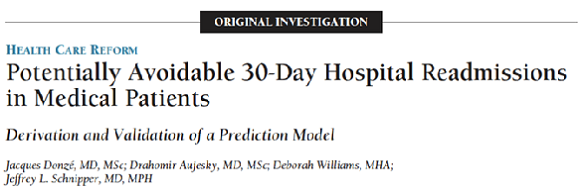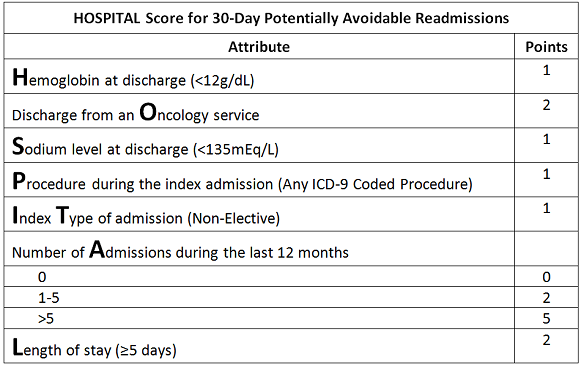The HOSPITAL Score: A Potential to Help Avoid 30-Day Readmissions
Studies show that one in five Medicare beneficiaries returns to the hospital within 30 days of discharge at an annual cost of $18 billion to the program. More importantly, many of these readmissions are thought to be preventable with better care. As a result of this, in the fall of 2012, Medicare began to penalize hospitals with excessive hospital readmissions for heart attacks, congestive heart failure, and pneumonia. The aim of this study was to derive and internally validate a simple score to help identify high-risk patients.

What they did:
- Derive and internally validate a prediction model to help avoid 30-day hospital re-admissions in medical patients
- Retrospective Cohort Study
- Academic Medical Center in Boston
- 10,731 discharges (2/3 derivation and 1/3 internal validation)
- Identify potentially avoidable 30-day readmissions
- 2,398/10,731 (22.3%) of discharges were followed by a 30-day readmission
- 879/10,731 (8.5%) of discharges were identified as avoidable
- 7 Independent factors identified (HOSPITAL Score):

- Most common procedures: Chemotherapy infusion (8.8%), Biopsy (7.5%), Transfusion (7.1%), and Endoscopy (6.1%)
- Score of 0-4 = Low Risk
- Score of 5 – 6 = Intermediate Risk
- Score >7 = High Risk
 Limitations:
Limitations:
- Did not track readmissions outside the hospital network
- Post-discharge mortality was not tracked
- HOSPITAL Score not externally validated
- This simple prediction model identifies before discharge the risk of potentially avoidable 30-day readmission in medical patients and who may need more intensive transitional care interventions
- Medicare will continue to penalize hospitals for high 30-day readmission rates, and the list of illnesses is likely to increase in the next few years
- Using a simple score to help predict high-risk patients for 30-day readmission would be an efficient way to focus time and effort
- An external validation still needs to be completed using The HOSPITAL Score before its implementation
Reference:
Donze J et al. Potentially Avoidable 30-Day Hospital Readmissions in Medical Patients: Derivation and Validation of a Prediction Model. JAMA Intern Med 2013 Apr; 173 (8): 632 – 638. PMID: 23529115
_______________________________________________________________________________
Dr. Salim R. Rezaie is a physician at the University of Texas Health Science Center at San Antonio. He is double board-certified in Emergency Medicine and Internal Medicine.








